The world is moving much more quickly than before, and GITEX Global 2025 is where all these new ideas will collide. It will be held from 13 to 17 October 2025 in Dubai and is described as the largest technology and AI expo in the world.
This year, GITEX was not only about displaying new devices; it was also about how AI, quantum computers, biotech, and cybersecurity are transforming our lives and the future of labor. It hosted over 6,800 companies, 2,000 startups, and 1,200 investors representing 180 countries, making it an enormous international gathering of innovation and creativity.
The special thing about this year, though, is that GITEX became truly international. New editions of the event were declared in Turkiye, Brazil, India, and Serbia, and they demonstrated that technology is linking the globe as never before.
In this guide, you will receive a basic tour of the five days of GITEX Global 2025—the largest themes, major announcements, and new unions. You will also learn how the Middle East is emerging as a major centre of AI and what to expect next as GITEX relocates to Expo City Dubai in 2026.
What is GITEX Global? Background & Evolution
GITEX Global began over 40 years ago as a small computer and electronics fair in Dubai. Gradually, it became one of the largest technological and innovation events in the world. It is currently gathering governments, international tech firms, startups, and investors all under a single roof to brainstorm and predict the future of technology.
The 2025 edition was held between 13 and 17 October in the Dubai World Trade Centre and the Dubai Harbour. This year, it was even larger, hosting 6,800 companies, 2,000 startups, and 1,200 investors from 180 countries. It included nearly all sectors of innovation, such as artificial intelligence and quantum computing, biotech, green energy, and cybersecurity.
The unique thing about GITEX is that it is not just a technology show but a place where new products are introduced, billion-dollar deals are made, future trends are set, and so on. Google, Microsoft, Huawei, IBM, and Dell are companies that present their greatest inventions at GITEX.
Other initiatives by GITEX Global have seen Dubai emerge as an international hub of technology and digital revolution through efforts in AI, innovation, and teamwork. It is more than an event; it is a movement taking the world towards a smarter, smoother, connected future.
Day 1 – Opening & Global Collaboration
GITEX Global 2025 Day 1 was full of excitement and energy, with thousands of people in attendance. The event opened with world leaders, CEOs, and innovators meeting to explain how technology can unite countries and create smarter civilizations.
The introductory sessions were given to AI-native societies and countries that are not merely utilizing artificial intelligence but as part of their systems, such as education, healthcare, and state services.
Sam Altman (CEO of OpenAI) and Peng Xiao (CEO of G42) emphasized how, through collaboration, governments and businesses can create a safe, useful, and accessible AI for all. Find out how global tech giants like OpenAI and G42 came together to build AI-powered nations in Dubai, hosts the Future – GITEX Global 2025.
GITEX gained influence over other regions of the world when Brazil was named the Country Partner of 2025. New national pavilions, such as Turkiye and Estonia, debuted as well, focusing on innovation in growing technological areas. You can also collect more information about what happened on the first day in our GITEX Global 2025 Day 1 Recap.
Day 2 – Nation Scale AI & Computing Power
On Day 2 of GITEX Global 2025, we discussed how nations are establishing their own artificial intelligence infrastructure—the supercomputers, data centres, and clouds that enable artificial intelligence on a national scale.
The discussions pointed to the fact that AI becomes a national resource similar to electricity or oil in the past. The speakers noted that AI requires powerful computational capabilities, secure data companies, and talent (domestically). Innovation cannot develop without these grounds.
The leading organisations, including OpenAI, Microsoft, G42, and Core42, launched projects that demonstrated to governments how these digital foundations can be constructed responsibly. Another significant event was the UAE-US 5 GW AI Campus, which is one of the largest AI infrastructure projects globally and will enable the UAE to lead in advanced computing and research. For a closer look at how countries are building huge AI systems, read our Day 2 Report on Nation-Scale AI and Computing Power.
Other firms, such as Cisco, Oracle, and Khazna Data Centres, talked about strategies for new “intelligence grids,” huge networks linking countries and industries via shared AI facilities.
Day 3 – Biotech, Digital Health & Science Transformation
Day 3 of GITEX Global 2025 was dedicated to the unity of technology and science in advancing human existence. Machines and data were overshadowed by a focus on health, biology, and the future of medicine. Learn how AI and biotech are shaping the future of health in our GITEX Global 2025 Day 3 Report.
Researchers discussed the role of AI, biotechnology, and quantum computers in assisting physicians in finding cures more quickly, researching genetics, and even averting illnesses before they occur. This demonstrated that technology is not simply driving industries—it is saving lives.
Some spearhead speakers and innovations highlighted the day. Trevor Martin of Mammoth Biosciences discussed how AI and CRISPR are used to cure rare diseases. Matt Angle of Paradromics demonstrated how speech implants are enabling people with speech disabilities to communicate once more. Ashley Zehnder of Fauna Bio explained how animal biology can create new medicines for mankind.
Day 4 – Cyber Resilience, Digital Sovereignty & Infrastructure
Day 4 of GITEX Global 2025 was devoted to a highly significant issue: trust and safety in the digital world. The rapid advancement of technology has made data, systems, and people one of the greatest concerns of every nation.
Cybersecurity experts, ministers, and world leaders convened to deliberate ways to ensure that countries can identify means to defend themselves against AI-based cyberattacks and have independence on their digital platforms. The discussions of the day have confirmed one thing: innovation does not mean anything when it is not safe. Check out how GITEX 2025 tackled cybersecurity and data trust in our Day 4 Feature on Cyber Resilience and Digital Sovereignty.
H.E. Omar Sultan Al Olama (the UAE Minister of State of AI) and H.E. Dr. Mohamed Al Kuwaiti (the leader of the UAE Cybersecurity Council) stated that the strategy to create effective cybersecurity systems and educate citizens is no less significant than the creation of new technologies. They introduced the UAE Cybersecurity Vision 2025, which is centered on collaboration, education, and innovation to ensure the country’s security.
Closing Day – Outcomes, Deals & What’s Next
The last day of the GITEX Global 2025 concluded a five-day period of fascination, international collaboration, and participation records. Energy was not only in the air, but companies and governments declared huge partnerships, investments, and agreements that would determine the future of technology.
This year, Dubai hosted 6,800 companies, 2,000 startups, and 1,200 investors representing 180 countries, demonstrating that it has become one of the most innovative countries in the world. Billions of dollars worth of MoUs (Memorandums of Understanding) were also signed over the week, reinforcing partnerships between tech giants and government institutions.
Among the largest announcements were those by companies such as Presight, which collaborated with Dubai Taxi Company to develop AI-enabled transportation systems, and AWS, which collaborated with e & to educate 30,000 individuals in AI and cloud computing. Abu Dhabi broke records by signing 19 smart city partnerships in a single day; it’s the Department of Municipalities and Transport.
One more important announcement at the closing ceremony concerns the GITEX Tech Cation 2026, which will be held in the Expo City Dubai and will be a combination of technology, tourism, and culture in a new format. For a full overview of everything from AI nations to biotech progress, read GITEX Global 2025 – From AI Nations to Biotech Breakthroughs.
Global Expansion: New GITEX Editions – Turkiye, Brazil, India & Serbia
GITEX Global 2025 did not end in Dubai but opened the gate to a much larger global region. In the process, event organizers revealed that GITEX will extend to new regions to bring together innovators, investors, and startups globally.
These are just a few of the new editions that will be available soon:
GITEX Ai Turkiye 2026 (Istanbul)
Established in September 2026, the show will reflect Turkiye’s role as an intermediary between the East and the West, gathering over 1,000 AI startups and 1,300 research centres devoted to advanced technology and digital investment. Learn more about GITEX’s global growth in our article GITEX AI Türkiye 2026 in Istanbul – The Digital Capital of the Future.
GITEX LATAM 2027 (Sao Paulo, Brazil)
This will mark the first time GITEX ventures into Latin America, scheduled for March 2027. It will assemble the region’s innovators to enhance connections in clean tech, fintech, and smart cities.
GITEX Ai India 2027 (Bengaluru)
This version will be held in April 2027 and will feature India’s fast-growing digital economy in areas such as AI, semiconductors, fintech, and green technology.
GITEX Ai Serbia 2027 (Belgrade)
This will be the first GITEX to be held in Southeast Europe, on the occasion of EXPO 2027, in May 2027, indicating the rising nature of the AI and ICT sectors in Serbia.
These international launches demonstrate how GITEX is emerging as a global network of innovation, which links emerging digital economies and establishes a common platform of knowledge, technologies, and sustainable development.
Regional Focus: The Middle East as a Global AI Powerhouse
The Middle East is no longer simply keeping pace with the world’s technology trends; it is setting trends. Conventions, such as the GITEX Global 2025, have demonstrated how nation-states in that area are becoming strong hubs of AI, digital transformation, and innovation.
The United Arab Emirates (UAE) is at the center of this increase. It is also investing in AI research, education, and infrastructure with ambitious plans such as the UAE Artificial Intelligence Strategy 2031 and the establishment of organizations like G42, MBZUAI (Mohamed bin Zayed University of Artificial Intelligence), and Core42.
Smart city projects, investment funds on AI, and collaboration with global tech giants are also helping other countries in the region to rapidly develop their tech environment, including Saudi Arabia and Qatar.
GITEX Global will be a reflector and facilitator of this transformation. It provides innovations by Middle Eastern startups, researchers, and government leaders with an international platform to showcase their innovations to the world. With AI in medicine, green data centers, and cybersecurity, the region shows that it has creative talent and the vision to shape the future. To learn how the Middle East is quickly becoming a global leader in AI, check out our article How the Middle East Is Rising as a Global AI Powerhouse.
Challenges Ahead
As GITEX Global 2025 demonstrated the pace of technological expansion, it also reminded everyone that inception will not be easy. We are entering an age where AI, quantum computing, and biotech are altering everything, but of they also introduce new problems.
One of the major problems is the lack of skilled people. Numerous nations require additional engineers, data scientists, and cybersecurity professionals to construct and operate new technologies. The lack of sufficiently trained talent may slow progress.
The other issue is the regulation and ethics of AI. With the increasing intelligence of machines, the issues of privacy, fairness, and safety become increasingly grave. The world continues to get used to formulating laws that are both pro-innovation and protect the rights of the people at the same time.
Other critical issues include energy and infrastructure. The power consumption is high to run large AI models and data centres. Countries will have to devise methods of ensuring that this growth is sustainable in terms of clean energy and efficient systems.
Conclusion
GITEX Global 2025 was not merely a show; it was a benchmark in the innovation sphere. Over five days, it gathered thousands of people, ideas, and technologies that are defining our future. GITEX saw the work of AI-driven countries and biotech solutions, cooperation in cybersecurity, and internationalization growth that made it clear that Dubai is now one of the major centers of innovation in the world.
Finally, the world should guarantee a level playing field in technology. Not all countries are equally digitalised, and the reason behind bridging this digital divide will be to have a fair and connected future.
The event was also a turning point in terms of the Middle East, where the region is shaping AI, green technology, and digital transformation. As GITEX continues to open up to new countries, it is assisting in creating a more connected, intelligent, and inclusive world.
Simply put, GITEX Global 2025 has established a precedent for what a technology summit can do, and the narrative is hardly complete. Innovation is no longer in the future but is made by collaboration, creativity, and vision. See how it all wrapped up in our GITEX Global 2025 Closing Highlights.
FAQs
When and where was GITEX Global 2025 held?
GITEX Global 2025 was hosted in Dubai World Trade Centre and Dubai Harbour, 13 -17 October 2025, with 180 countries represented.
Which countries launched new GITEX editions?
It announced new editions in Turkiye, Brazil (Latin America), and India, adding to the global network of innovation events that GITEX offers.
What were the major themes of GITEX Global 2025?
Among the major themes were artificial intelligence, quantum computing, biotech, cybersecurity, and sustainability, which demonstrated the revolution in technology in industries and societies.
How can startups benefit from GITEX?
Startups have a chance to meet investors, participate in competitions such as Expand North Star, and find other potential investors who can take their ideas worldwide.
What’s next after GITEX Global 2025?
The second launch will be GITEX TechCation 2026 in Expo City Dubai, a blend of technology, tourism, and culture to offer a new type of global experience.





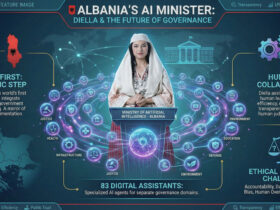




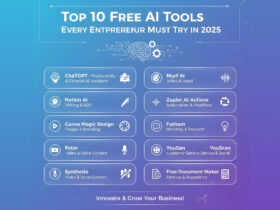

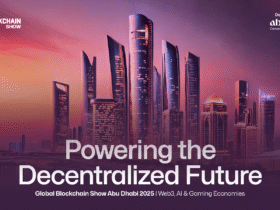


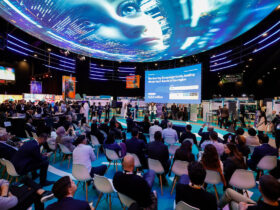
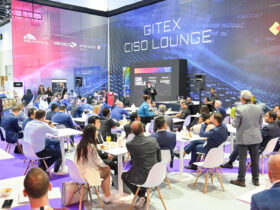


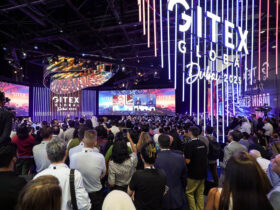
Leave a Reply